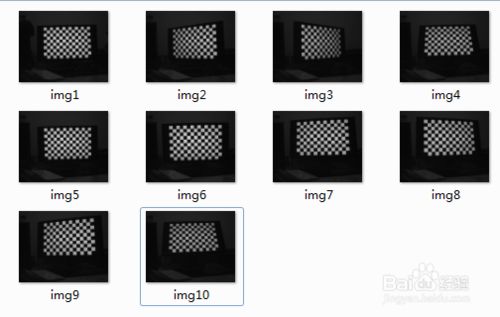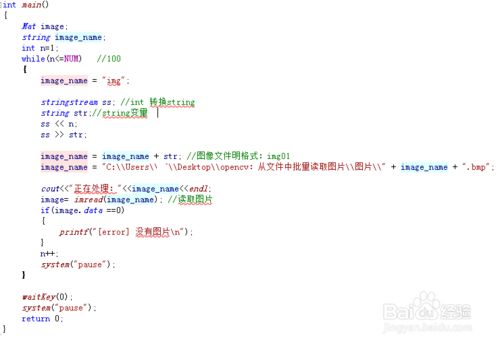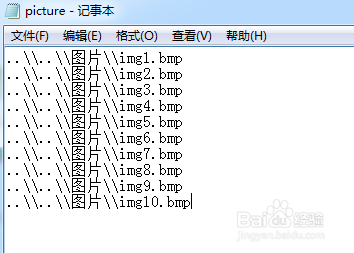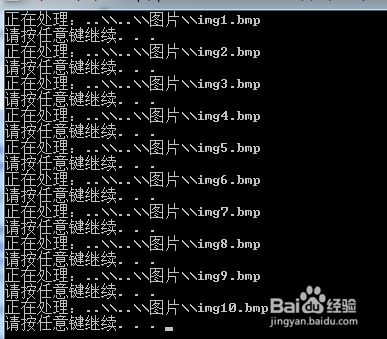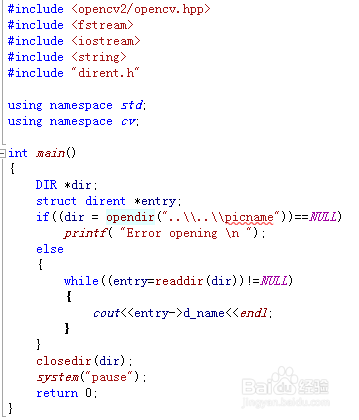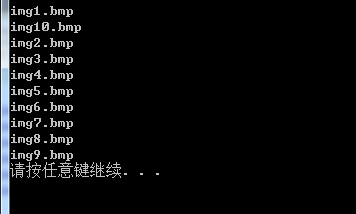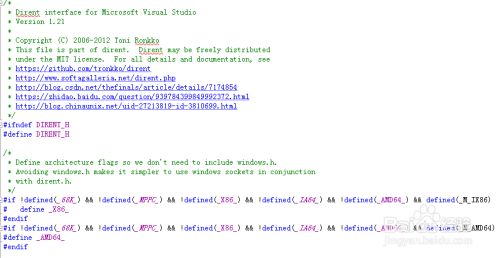【学习OpenCV】opencv:从文件中批量读取图片(百度文库)
方法/步骤
-
方法一:以一定规律命名的图像,
通过stringstream由int型变换为string型,
对图像进行读取;
-
方法二:以文本文件的格式批量读取图像:
如以.txt格式,则.txt的内容如下:
【注】:每行为一个图像名;
方法三:
-
只需要一个“dirent.h”头文件,便可以遍历指定文件夹的所有文件;
代码如下:
-
dirent.h:头文件
可以通过百度搜索并下载。
-
dirent.h:中的函数:
/*
* Open directory stream using plain old C-string.
*/
static DIR* opendir(const char *dirname)
{
struct DIR *dirp;
int error;
/* Must have directory name */
if (dirname == NULL || dirname[0] == '\0') {
dirent_set_errno (ENOENT);
return NULL;
}
/* Allocate memory for DIR structure */
dirp = (DIR*) malloc (sizeof (struct DIR));
if (dirp) {
wchar_t wname[PATH_MAX];
size_t n;
/* Convert directory name to wide-character string */
error = dirent_mbstowcs_s (&n, wname, PATH_MAX, dirname, PATH_MAX);
if (!error) {
/* Open directory stream using wide-character name */
dirp->wdirp = _wopendir (wname);
if (dirp->wdirp) {
/* Directory stream opened */
error = 0;
} else {
/* Failed to open directory stream */
error = 1;
}
} else {
/*
* Cannot convert file name to wide-character string. This
* occurs if the string contains invalid multi-byte sequences or
* the output buffer is too small to contain the resulting
* string.
*/
error = 1;
}
} else {
/* Cannot allocate DIR structure */
error = 1;
}
/* Clean up in case of error */
if (error && dirp) {
free (dirp);
dirp = NULL;
}
return dirp;
}
-
/*
* Read next directory entry.
*
* When working with text consoles, please note that file names returned by
* readdir() are represented in the default ANSI code page while any output to
* console is typically formatted on another code page. Thus, non-ASCII
* characters in file names will not usually display correctly on console. The
* problem can be fixed in two ways: (1) change the character set of console
* to 1252 using chcp utility and use Lucida Console font, or (2) use
* _cprintf function when writing to console. The _cprinf() will re-encode
* ANSI strings to the console code page so many non-ASCII characters will
* display correcly.
*/
static struct dirent* readdir(DIR *dirp)
{
WIN32_FIND_DATAW *datap;
struct dirent *entp;
/* Read next directory entry */
datap = dirent_next (dirp->wdirp);
if (datap) {
size_t n;
int error;
/* Attempt to convert file name to multi-byte string */
error = dirent_wcstombs_s(&n, dirp->ent.d_name, PATH_MAX, datap->cFileName, PATH_MAX);
/*
* If the file name cannot be represented by a multi-byte string,
* then attempt to use old 8+3 file name. This allows traditional
* Unix-code to access some file names despite of unicode
* characters, although file names may seem unfamiliar to the user.
*
* Be ware that the code below cannot come up with a short file
* name unless the file system provides one. At least
* VirtualBox shared folders fail to do this.
*/
if (error && datap->cAlternateFileName[0] != '\0') {
error = dirent_wcstombs_s(
&n, dirp->ent.d_name, PATH_MAX,
datap->cAlternateFileName, PATH_MAX);
}
if (!error) {
DWORD attr;
/* Initialize directory entry for return */
entp = &dirp->ent;
/* Length of file name excluding zero terminator */
entp->d_namlen = n - 1;
/* File attributes */
attr = datap->dwFileAttributes;
if ((attr & FILE_ATTRIBUTE_DEVICE) != 0) {
entp->d_type = DT_CHR;
} else if ((attr & FILE_ATTRIBUTE_DIRECTORY) != 0) {
entp->d_type = DT_DIR;
} else {
entp->d_type = DT_REG;
}
/* Reset dummy fields */
entp->d_ino = 0;
entp->d_reclen = sizeof (struct dirent);
} else {
/*
* Cannot convert file name to multi-byte string so construct
* an errornous directory entry and return that. Note that
* we cannot return NULL as that would stop the processing
* of directory entries completely.
*/
entp = &dirp->ent;
entp->d_name[0] = '?';
entp->d_name[1] = '\0';
entp->d_namlen = 1;
entp->d_type = DT_UNKNOWN;
entp->d_ino = 0;
entp->d_reclen = 0;
}
} else {
/* No more directory entries */
entp = NULL;
}
return entp;
}
-
/*
* Close directory stream.
*/
static int closedir(DIR *dirp)
{
int ok;
if (dirp) {
/* Close wide-character directory stream */
ok = _wclosedir (dirp->wdirp);
dirp->wdirp = NULL;
/* Release multi-byte character version */
free (dirp);
} else {
/* Invalid directory stream */
dirent_set_errno (EBADF);
ok = /*failure*/-1;
}
return ok;
}
END
注意事项
-
通过stringstream由int型变换为string型
-
txt中,每行为一个图像名
-
只需要一个“dirent.h”头文件,便可以遍历指定文件夹的所有文件
